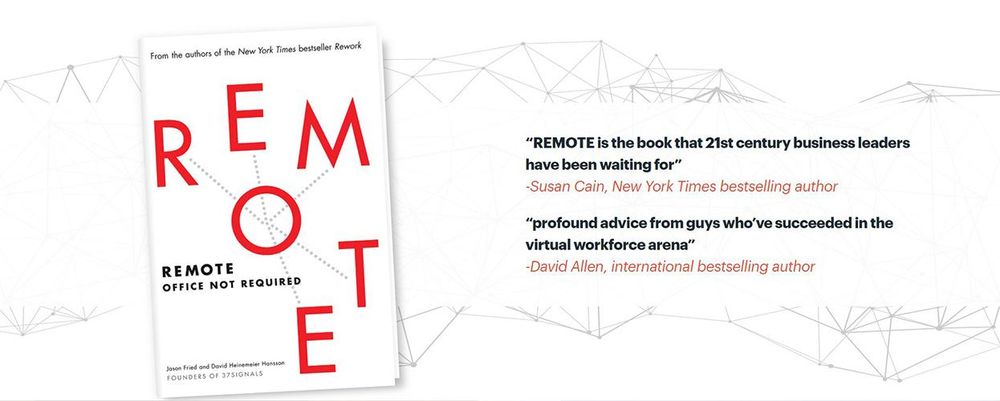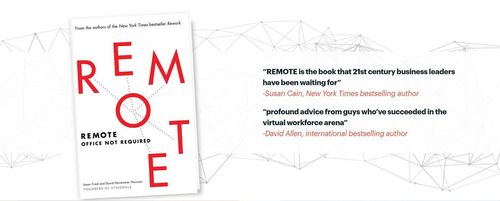

Reading recommendation: on remote work in a memorable book
04 December, 2023
Share this article
If you are looking for an exhilarating reading to help you get straight to the point on the peculiarities and advantages of remote work, we have a perfect suggestion for you: the bestseller “Remote: Office Not Required.”
Have you ever thought that your talent and professional worth are not conditioned by your physical presence in a business center or a large city? Or that hard work, really creative and important is not happening in the office, but away from the distractions that you can’t control? “Where do you go when you really have to get work done?” – a question that will make you think right from the beginning, just like many other brilliant observations gathered in this book’s pages. Written in an honest and positive style, they send a clear message: by saying yes to remote work, you learn to value the work itself and not the time you spend working; you learn to evaluate concrete results and not to keep track of the chairs occupied in endless office meetings; you learn to appreciate what really matters both on a human and a business level.
The reading primarily offers a change of perspective on remote work, demonstrating that this is already a reality which sooner or later will be appreciated and assimilated on a large scale. Given that technology is now aligned with the requirements of working outside the office, and financially speaking this concept has already proven its value, what remains to be done is an upgrade in the general perception about remote work.
Are you skeptical or just have a lot of questions about transition to remote? Starting from examples of small and large companies that have fully or partially implemented this working style, “Remote” dismantles restraints and prejudices, encourages managers to creatively address this strategy in order to make it successful. You will find in this book an open approach to the fears and common excuses that companies invoke when it comes to adopting remote work. From “I’ll lose control” to “our competitors don’t do it”, from “your colleagues who come to the office will become jealous” to “only the office provides enough security”, you’ll see that most of these fears are unfounded, and even the justified ones have simple solutions as long as you’re willing to think flexibly and inventively.
Does magic only happen in the office? Do you always need an immediate answer to any question? Are frequent meetings with dozens of participants really effective? Many of these old beliefs and habits lose relevance when we manage to properly integrate remote work and focus on what really matters. For example, instead of chasing countless ideas in brainstorming sessions at the office, we can set one or few major goals for a longer period of time, and then each of us will focus better on what he has to do.
Another precious idea that the authors of the book constantly emphasize and assert is that when you are not physically close to your employees, you will be able to truly evaluate their work. By working remotely, you have the advantage of clearly appreciating actual results. Instead of saying, “Come to my office and tell me about you’ve been working on,” you’re going to say, “Show me what you’ve been working on.” Finally, this kind of transparency naturally leads to the conclusion that great remote workers are simply great workers. They show you what they know and bring concrete results, which are much easier to evaluate in the context of remote work.
The book pays equal attention to employees, giving them suggestions on how to manage their work and lifestyle, avoid burnout and keep their motivation high. By offering the advantage of a better balance between work and our personal life, it is no wonder that remote is seen as the new luxury and that it is starting to weight a lot in our career choices.
If we managed to capture your interest and you’ve already put “Remote” on your reading list, you will see that this book is suitable both for those who consider remote work pure madness and for those who embrace it enthusiastically, but do not know exactly how to implement it. Published in 2013 in times when the labour market was still discreetly flirting with the idea of this kind of employment, the book has since become a true manual for an entire planet constrained by the pandemic to face the reality of working outside the office. The authors are Jason Fried, founder of the software company Basecamp (formerly 37signals), and David Heinemeier Hansson, partner in the same business.
Unquestionably, remote work is becoming a reality for more and more people. Or, as the authors of this great book say, “Remote work is here, and it’s here to stay. The only question is whether you’ll be part of the early adopters, the early majority, the late majority, or the laggards.”
Which one of these groups will you belong to?
Book review
Keep up to date with our most recent articles, events and all that Pluria has to offer you.
By subscribing to the newsletter you agree with the privacy policy.

In the increasingly exhausting rhythm of modern life, chronic stress has become one of the most harmful factors affecting society at a wide scale. In the face of this challenge, we have two options: to conti[...]
04 December, 2023

The concept of coworking, as we know it today, is a recent one, but it has evolved in a short time at a spe[...]
04 December, 2023

No matter how many years have passed since your last professional accreditation or how much experience you have gained in the meantime, your skills’ development is a process based on continuous learning. We [...]
04 December, 2023